Self-care and Conflict of Interest in Psychiatry
VerifiedAdded on 2023/06/04
|5
|1244
|233
AI Summary
This paper discusses the growing concern of conflict of interest in psychiatry and the importance of self-care techniques to manage mental health issues and prevent burnout. It also explores the ethical dilemma in mental health and the role of self-care in approaching it.
Contribute Materials
Your contribution can guide someone’s learning journey. Share your
documents today.
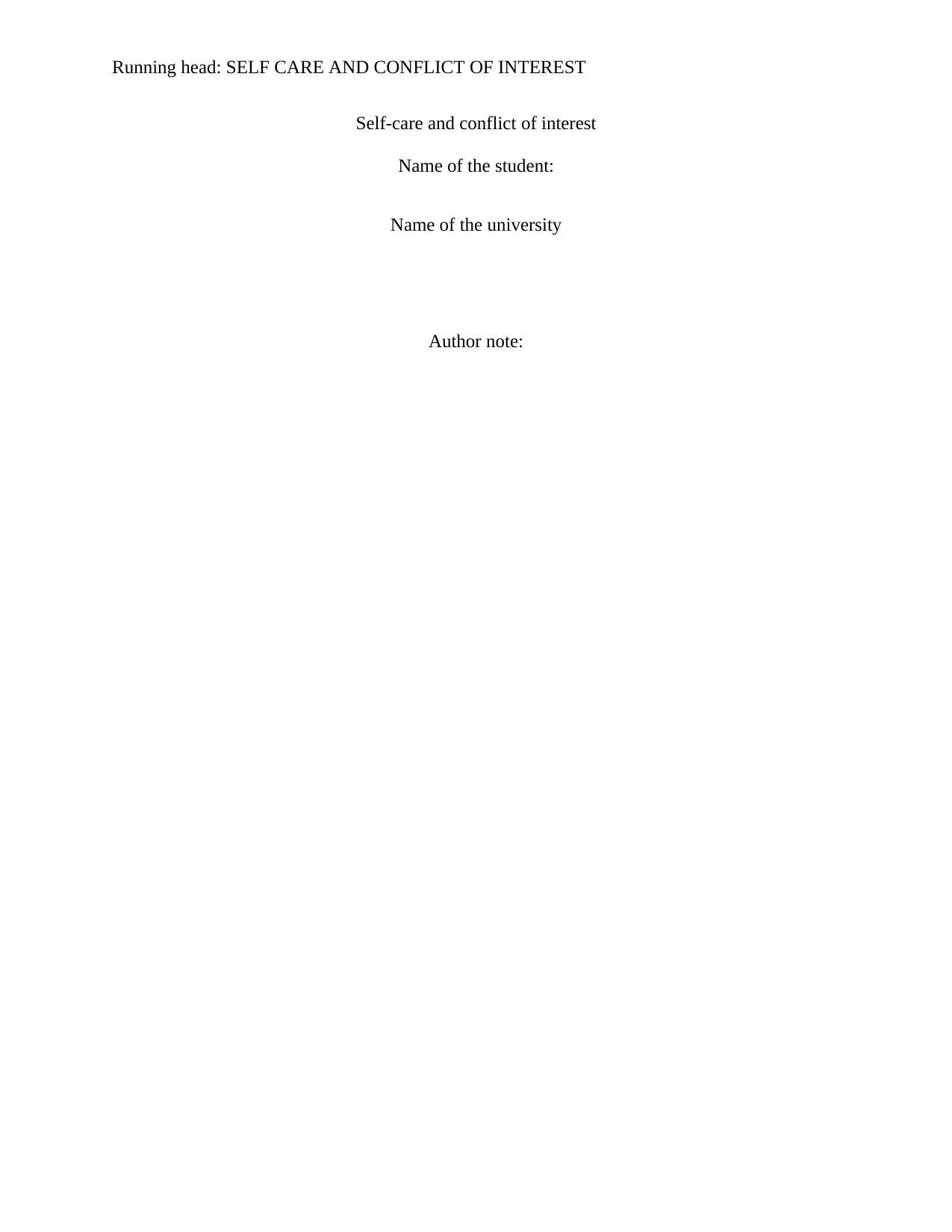
Running head: SELF CARE AND CONFLICT OF INTEREST
Self-care and conflict of interest
Name of the student:
Name of the university
Author note:
Self-care and conflict of interest
Name of the student:
Name of the university
Author note:
Secure Best Marks with AI Grader
Need help grading? Try our AI Grader for instant feedback on your assignments.
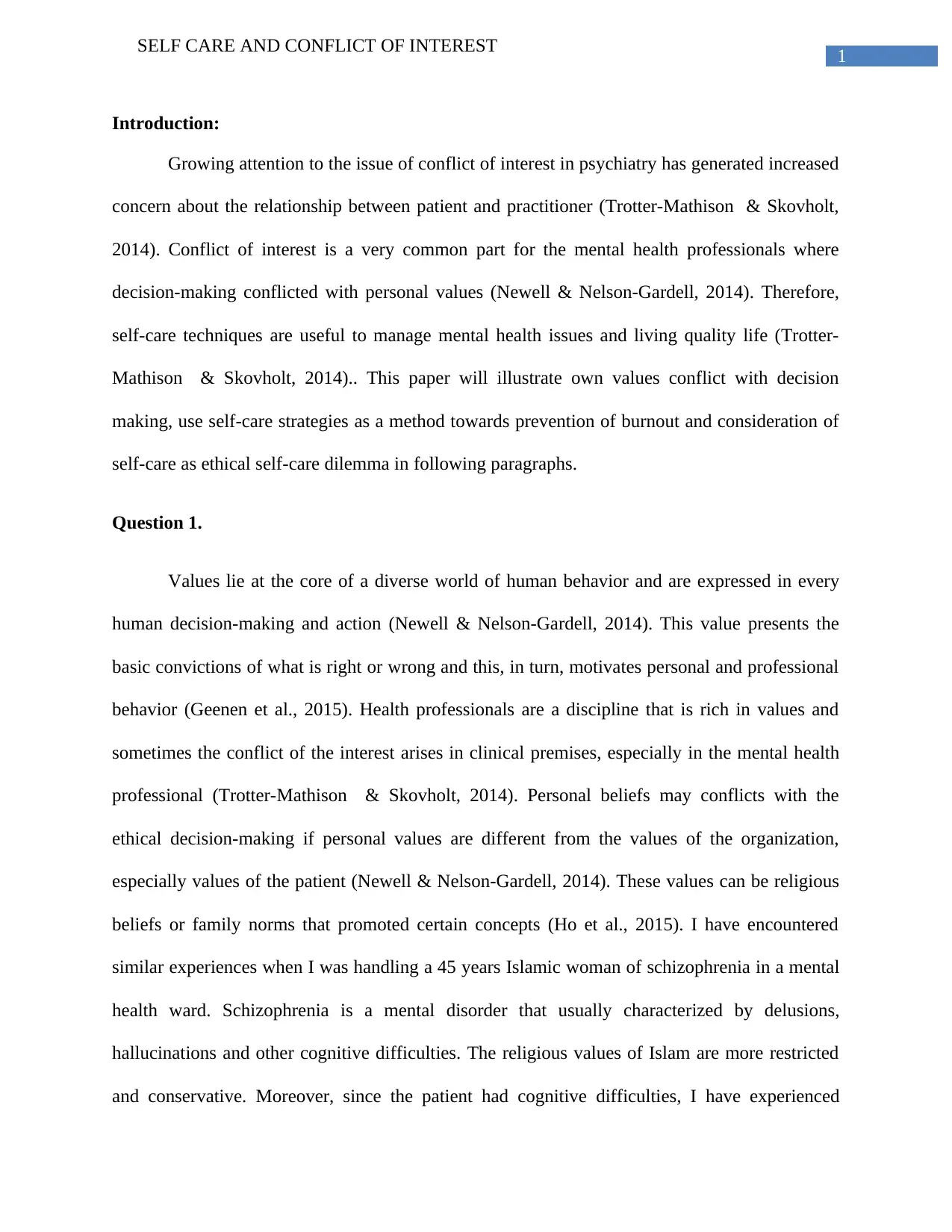
1
SELF CARE AND CONFLICT OF INTEREST
Introduction:
Growing attention to the issue of conflict of interest in psychiatry has generated increased
concern about the relationship between patient and practitioner (Trotter-Mathison & Skovholt,
2014). Conflict of interest is a very common part for the mental health professionals where
decision-making conflicted with personal values (Newell & Nelson-Gardell, 2014). Therefore,
self-care techniques are useful to manage mental health issues and living quality life (Trotter-
Mathison & Skovholt, 2014).. This paper will illustrate own values conflict with decision
making, use self-care strategies as a method towards prevention of burnout and consideration of
self-care as ethical self-care dilemma in following paragraphs.
Question 1.
Values lie at the core of a diverse world of human behavior and are expressed in every
human decision-making and action (Newell & Nelson-Gardell, 2014). This value presents the
basic convictions of what is right or wrong and this, in turn, motivates personal and professional
behavior (Geenen et al., 2015). Health professionals are a discipline that is rich in values and
sometimes the conflict of the interest arises in clinical premises, especially in the mental health
professional (Trotter-Mathison & Skovholt, 2014). Personal beliefs may conflicts with the
ethical decision-making if personal values are different from the values of the organization,
especially values of the patient (Newell & Nelson-Gardell, 2014). These values can be religious
beliefs or family norms that promoted certain concepts (Ho et al., 2015). I have encountered
similar experiences when I was handling a 45 years Islamic woman of schizophrenia in a mental
health ward. Schizophrenia is a mental disorder that usually characterized by delusions,
hallucinations and other cognitive difficulties. The religious values of Islam are more restricted
and conservative. Moreover, since the patient had cognitive difficulties, I have experienced
SELF CARE AND CONFLICT OF INTEREST
Introduction:
Growing attention to the issue of conflict of interest in psychiatry has generated increased
concern about the relationship between patient and practitioner (Trotter-Mathison & Skovholt,
2014). Conflict of interest is a very common part for the mental health professionals where
decision-making conflicted with personal values (Newell & Nelson-Gardell, 2014). Therefore,
self-care techniques are useful to manage mental health issues and living quality life (Trotter-
Mathison & Skovholt, 2014).. This paper will illustrate own values conflict with decision
making, use self-care strategies as a method towards prevention of burnout and consideration of
self-care as ethical self-care dilemma in following paragraphs.
Question 1.
Values lie at the core of a diverse world of human behavior and are expressed in every
human decision-making and action (Newell & Nelson-Gardell, 2014). This value presents the
basic convictions of what is right or wrong and this, in turn, motivates personal and professional
behavior (Geenen et al., 2015). Health professionals are a discipline that is rich in values and
sometimes the conflict of the interest arises in clinical premises, especially in the mental health
professional (Trotter-Mathison & Skovholt, 2014). Personal beliefs may conflicts with the
ethical decision-making if personal values are different from the values of the organization,
especially values of the patient (Newell & Nelson-Gardell, 2014). These values can be religious
beliefs or family norms that promoted certain concepts (Ho et al., 2015). I have encountered
similar experiences when I was handling a 45 years Islamic woman of schizophrenia in a mental
health ward. Schizophrenia is a mental disorder that usually characterized by delusions,
hallucinations and other cognitive difficulties. The religious values of Islam are more restricted
and conservative. Moreover, since the patient had cognitive difficulties, I have experienced
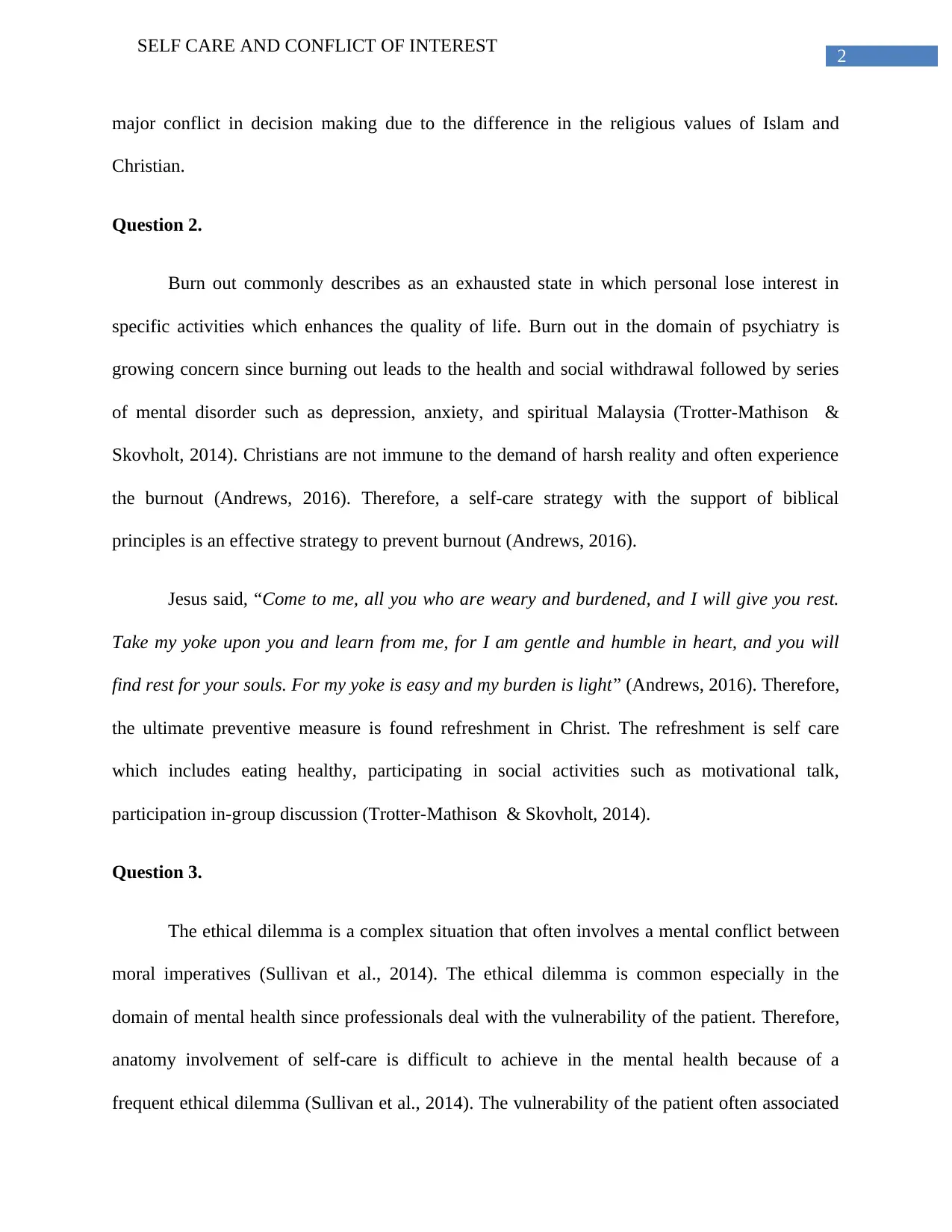
2
SELF CARE AND CONFLICT OF INTEREST
major conflict in decision making due to the difference in the religious values of Islam and
Christian.
Question 2.
Burn out commonly describes as an exhausted state in which personal lose interest in
specific activities which enhances the quality of life. Burn out in the domain of psychiatry is
growing concern since burning out leads to the health and social withdrawal followed by series
of mental disorder such as depression, anxiety, and spiritual Malaysia (Trotter-Mathison &
Skovholt, 2014). Christians are not immune to the demand of harsh reality and often experience
the burnout (Andrews, 2016). Therefore, a self-care strategy with the support of biblical
principles is an effective strategy to prevent burnout (Andrews, 2016).
Jesus said, “Come to me, all you who are weary and burdened, and I will give you rest.
Take my yoke upon you and learn from me, for I am gentle and humble in heart, and you will
find rest for your souls. For my yoke is easy and my burden is light” (Andrews, 2016). Therefore,
the ultimate preventive measure is found refreshment in Christ. The refreshment is self care
which includes eating healthy, participating in social activities such as motivational talk,
participation in-group discussion (Trotter-Mathison & Skovholt, 2014).
Question 3.
The ethical dilemma is a complex situation that often involves a mental conflict between
moral imperatives (Sullivan et al., 2014). The ethical dilemma is common especially in the
domain of mental health since professionals deal with the vulnerability of the patient. Therefore,
anatomy involvement of self-care is difficult to achieve in the mental health because of a
frequent ethical dilemma (Sullivan et al., 2014). The vulnerability of the patient often associated
SELF CARE AND CONFLICT OF INTEREST
major conflict in decision making due to the difference in the religious values of Islam and
Christian.
Question 2.
Burn out commonly describes as an exhausted state in which personal lose interest in
specific activities which enhances the quality of life. Burn out in the domain of psychiatry is
growing concern since burning out leads to the health and social withdrawal followed by series
of mental disorder such as depression, anxiety, and spiritual Malaysia (Trotter-Mathison &
Skovholt, 2014). Christians are not immune to the demand of harsh reality and often experience
the burnout (Andrews, 2016). Therefore, a self-care strategy with the support of biblical
principles is an effective strategy to prevent burnout (Andrews, 2016).
Jesus said, “Come to me, all you who are weary and burdened, and I will give you rest.
Take my yoke upon you and learn from me, for I am gentle and humble in heart, and you will
find rest for your souls. For my yoke is easy and my burden is light” (Andrews, 2016). Therefore,
the ultimate preventive measure is found refreshment in Christ. The refreshment is self care
which includes eating healthy, participating in social activities such as motivational talk,
participation in-group discussion (Trotter-Mathison & Skovholt, 2014).
Question 3.
The ethical dilemma is a complex situation that often involves a mental conflict between
moral imperatives (Sullivan et al., 2014). The ethical dilemma is common especially in the
domain of mental health since professionals deal with the vulnerability of the patient. Therefore,
anatomy involvement of self-care is difficult to achieve in the mental health because of a
frequent ethical dilemma (Sullivan et al., 2014). The vulnerability of the patient often associated
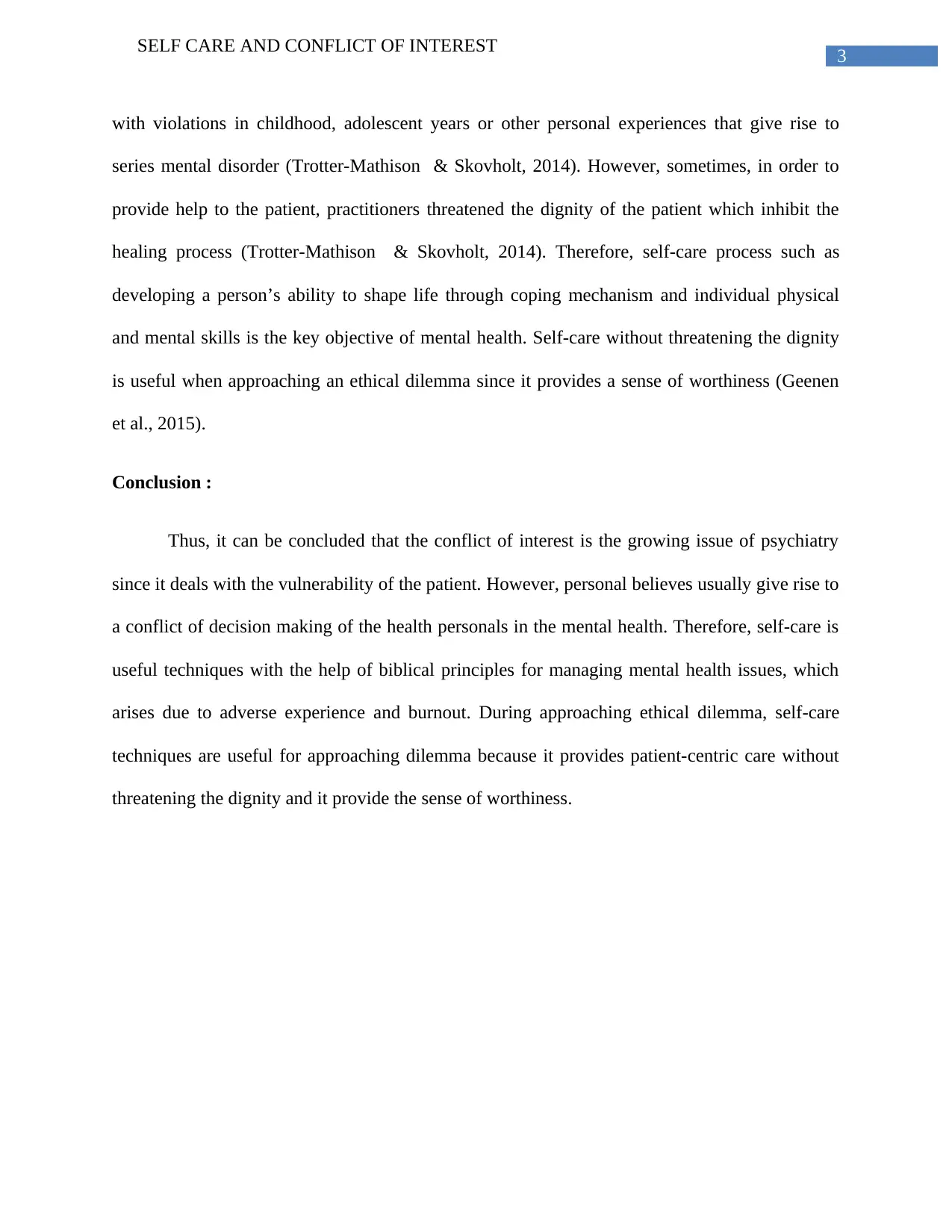
3
SELF CARE AND CONFLICT OF INTEREST
with violations in childhood, adolescent years or other personal experiences that give rise to
series mental disorder (Trotter-Mathison & Skovholt, 2014). However, sometimes, in order to
provide help to the patient, practitioners threatened the dignity of the patient which inhibit the
healing process (Trotter-Mathison & Skovholt, 2014). Therefore, self-care process such as
developing a person’s ability to shape life through coping mechanism and individual physical
and mental skills is the key objective of mental health. Self-care without threatening the dignity
is useful when approaching an ethical dilemma since it provides a sense of worthiness (Geenen
et al., 2015).
Conclusion :
Thus, it can be concluded that the conflict of interest is the growing issue of psychiatry
since it deals with the vulnerability of the patient. However, personal believes usually give rise to
a conflict of decision making of the health personals in the mental health. Therefore, self-care is
useful techniques with the help of biblical principles for managing mental health issues, which
arises due to adverse experience and burnout. During approaching ethical dilemma, self-care
techniques are useful for approaching dilemma because it provides patient-centric care without
threatening the dignity and it provide the sense of worthiness.
SELF CARE AND CONFLICT OF INTEREST
with violations in childhood, adolescent years or other personal experiences that give rise to
series mental disorder (Trotter-Mathison & Skovholt, 2014). However, sometimes, in order to
provide help to the patient, practitioners threatened the dignity of the patient which inhibit the
healing process (Trotter-Mathison & Skovholt, 2014). Therefore, self-care process such as
developing a person’s ability to shape life through coping mechanism and individual physical
and mental skills is the key objective of mental health. Self-care without threatening the dignity
is useful when approaching an ethical dilemma since it provides a sense of worthiness (Geenen
et al., 2015).
Conclusion :
Thus, it can be concluded that the conflict of interest is the growing issue of psychiatry
since it deals with the vulnerability of the patient. However, personal believes usually give rise to
a conflict of decision making of the health personals in the mental health. Therefore, self-care is
useful techniques with the help of biblical principles for managing mental health issues, which
arises due to adverse experience and burnout. During approaching ethical dilemma, self-care
techniques are useful for approaching dilemma because it provides patient-centric care without
threatening the dignity and it provide the sense of worthiness.
Secure Best Marks with AI Grader
Need help grading? Try our AI Grader for instant feedback on your assignments.
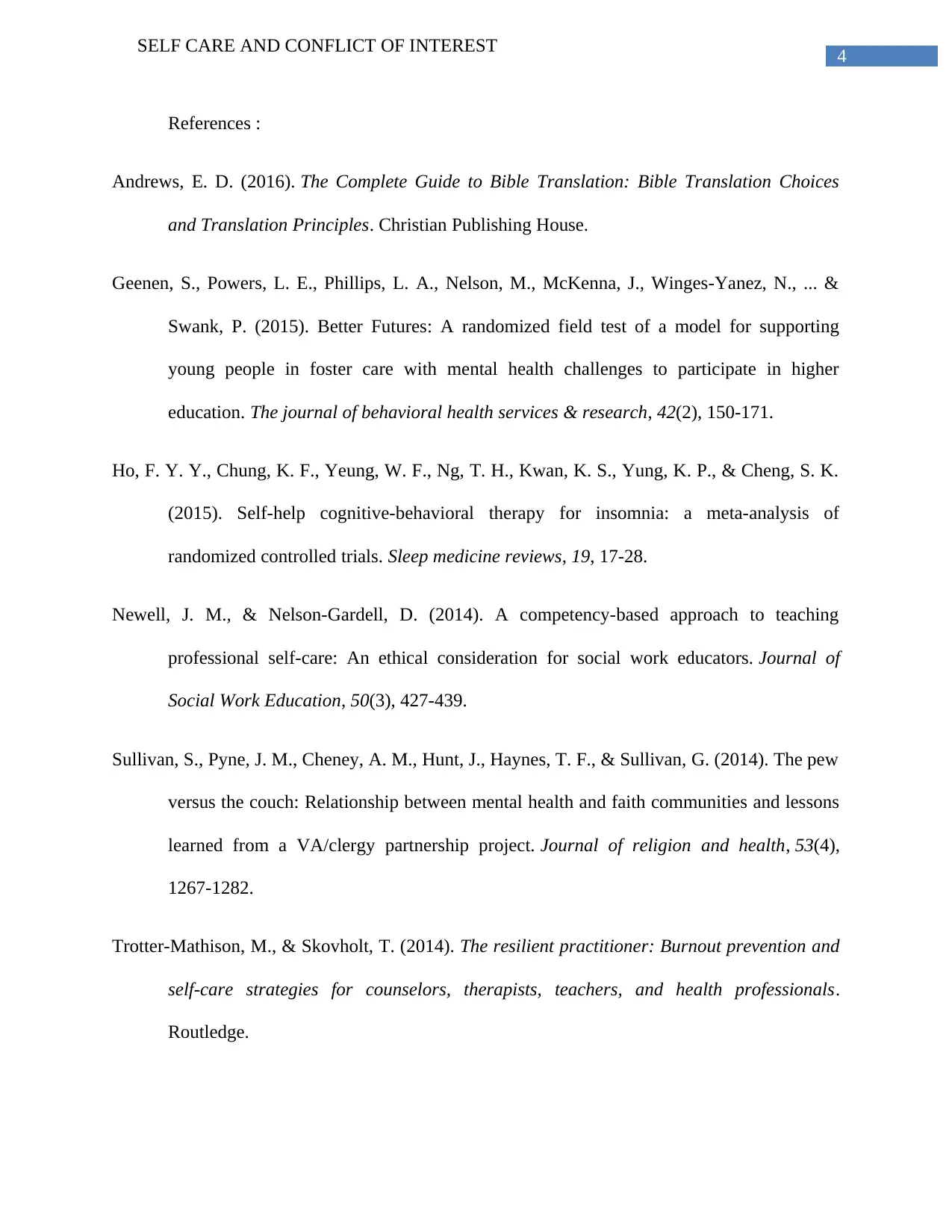
4
SELF CARE AND CONFLICT OF INTEREST
References :
Andrews, E. D. (2016). The Complete Guide to Bible Translation: Bible Translation Choices
and Translation Principles. Christian Publishing House.
Geenen, S., Powers, L. E., Phillips, L. A., Nelson, M., McKenna, J., Winges-Yanez, N., ... &
Swank, P. (2015). Better Futures: A randomized field test of a model for supporting
young people in foster care with mental health challenges to participate in higher
education. The journal of behavioral health services & research, 42(2), 150-171.
Ho, F. Y. Y., Chung, K. F., Yeung, W. F., Ng, T. H., Kwan, K. S., Yung, K. P., & Cheng, S. K.
(2015). Self-help cognitive-behavioral therapy for insomnia: a meta-analysis of
randomized controlled trials. Sleep medicine reviews, 19, 17-28.
Newell, J. M., & Nelson-Gardell, D. (2014). A competency-based approach to teaching
professional self-care: An ethical consideration for social work educators. Journal of
Social Work Education, 50(3), 427-439.
Sullivan, S., Pyne, J. M., Cheney, A. M., Hunt, J., Haynes, T. F., & Sullivan, G. (2014). The pew
versus the couch: Relationship between mental health and faith communities and lessons
learned from a VA/clergy partnership project. Journal of religion and health, 53(4),
1267-1282.
Trotter-Mathison, M., & Skovholt, T. (2014). The resilient practitioner: Burnout prevention and
self-care strategies for counselors, therapists, teachers, and health professionals.
Routledge.
SELF CARE AND CONFLICT OF INTEREST
References :
Andrews, E. D. (2016). The Complete Guide to Bible Translation: Bible Translation Choices
and Translation Principles. Christian Publishing House.
Geenen, S., Powers, L. E., Phillips, L. A., Nelson, M., McKenna, J., Winges-Yanez, N., ... &
Swank, P. (2015). Better Futures: A randomized field test of a model for supporting
young people in foster care with mental health challenges to participate in higher
education. The journal of behavioral health services & research, 42(2), 150-171.
Ho, F. Y. Y., Chung, K. F., Yeung, W. F., Ng, T. H., Kwan, K. S., Yung, K. P., & Cheng, S. K.
(2015). Self-help cognitive-behavioral therapy for insomnia: a meta-analysis of
randomized controlled trials. Sleep medicine reviews, 19, 17-28.
Newell, J. M., & Nelson-Gardell, D. (2014). A competency-based approach to teaching
professional self-care: An ethical consideration for social work educators. Journal of
Social Work Education, 50(3), 427-439.
Sullivan, S., Pyne, J. M., Cheney, A. M., Hunt, J., Haynes, T. F., & Sullivan, G. (2014). The pew
versus the couch: Relationship between mental health and faith communities and lessons
learned from a VA/clergy partnership project. Journal of religion and health, 53(4),
1267-1282.
Trotter-Mathison, M., & Skovholt, T. (2014). The resilient practitioner: Burnout prevention and
self-care strategies for counselors, therapists, teachers, and health professionals.
Routledge.
1 out of 5
Your All-in-One AI-Powered Toolkit for Academic Success.
+13062052269
info@desklib.com
Available 24*7 on WhatsApp / Email
![[object Object]](/_next/static/media/star-bottom.7253800d.svg)
Unlock your academic potential
© 2024 | Zucol Services PVT LTD | All rights reserved.